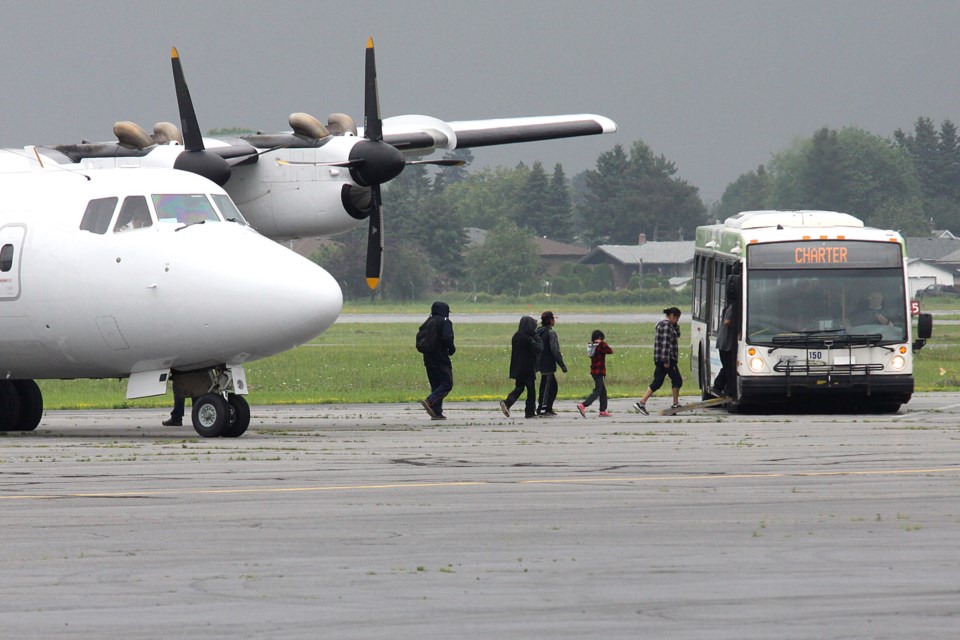THUNDER BAY – Pikangikum First Nation members who voluntarily fled as wildfires burned mere kilometres from their community have started returning home, though there is no clear timeline for when all evacuees will leave Thunder Bay.
About 1,000 people from the remote Northwestern Ontario Indigenous community have been hosted in Thunder Bay, after a full evacuation was ordered last week as heavy smoke from a nearby forest fire blanketed the community.
While the fire – Red Lake 39 – burns six kilometres from Pikangikum at a size of more than 44,000 hectares and remains classified by the Ministry of Natural Resources and Forestry as not under control, rain and fire suppression efforts have made progress on the flank near the community.
“People have started to return to Pikangikum (Wednesday) of their own volition,” Thunder Bay city manager Norm Gale said at a Wednesday afternoon news conference. “We’re not involved in the formal part of repatriating those people but we do know people are leaving (Wednesday).”
More people will be leaving on flights beginning on Thursday, Gale added, though he could not provide details on the number of people would be immediately returning home.
“This current situation is not over,” Gale said.
A Tuesday evening posting on a Facebook page providing updates to evacuees said people who self-evacuated could begin returning on Wednesday at their own risk, and would receive a gas card after deregistering with support staff.
The evacuees who arrived in Thunder Bay included more than 200 people who were evacuated through a provincially-coordinated airlift effort, as well as about 700 others who self-evacuated with the support of the Independent First Nations Alliance (IFNA). Three local hotels have been providing accommodations for the evacuees.
Thunder Bay was initially prepared to host a total of 400 evacuees brought the formal process but late last week city officials said acceptance of further evacuees was through the coordinated evacuation was being halted as resources were being devoted to help support the self-evacuated group.
Gale said, in his experience with the city’s emergency operations control group, this was the largest component of people who have come to the city outside of a provincially-coordinated evacuation process.
The self-evacuated group, while they had been receiving services and support from IFNA, initially had no direct involvement from the city’s response, but that changed late last week.
“We support IFNA and we add value but that support was being provided,” Gale said. “Downstream, it’s about relationships. It’s about working together and talking with each other. We’re ever improving in that regard.”
Another remote Northwestern Ontario First Nations community – Keewaywin First Nation – has been evacuated because of a separate forest fire threat, with community members hosted in Sioux Lookout and Timmins. The Ontario provincial government last week appealed for other municipalities to step forward as potential host communities before Saskatchewan intervened and promised to host 2,000 evacuees.
Kapuskasing and Hearst are also hosting Pikangikum evacuees.
Mayor Bill Mauro, who said the commitment by Saskatchewan alleviated pressure on host communities like Thunder Bay, urged the federal and provincial governments to have something in place, outlining a plan for situations if there aren’t municipalities willing to bring in evacuees.
“It seems like if we can anticipate that the situation will reoccur, we should try to avoid a situation where there are not enough host communities ready and able to take evacuees,” Mauro said.
The costs of the evacuation are funded federally through Indigenous Services Canada along with the Ontario provincial government, Gale said, emphasizing that the city is not concerned about finances.
Already this year, Thunder Bay has hosted members of Kashechewan First Nation after residents were evacuated from the James Bay area community in May due to the threat of flooding and people from Pikangikum who had been forced out of their community already once this year by wildfire.
“We do this because we’re neighbours,” Gale said. “We do this out of respect, compassion and empathy. These people are under duress. This is not a good situation for them and we are happy to do everything we can to help them.”
